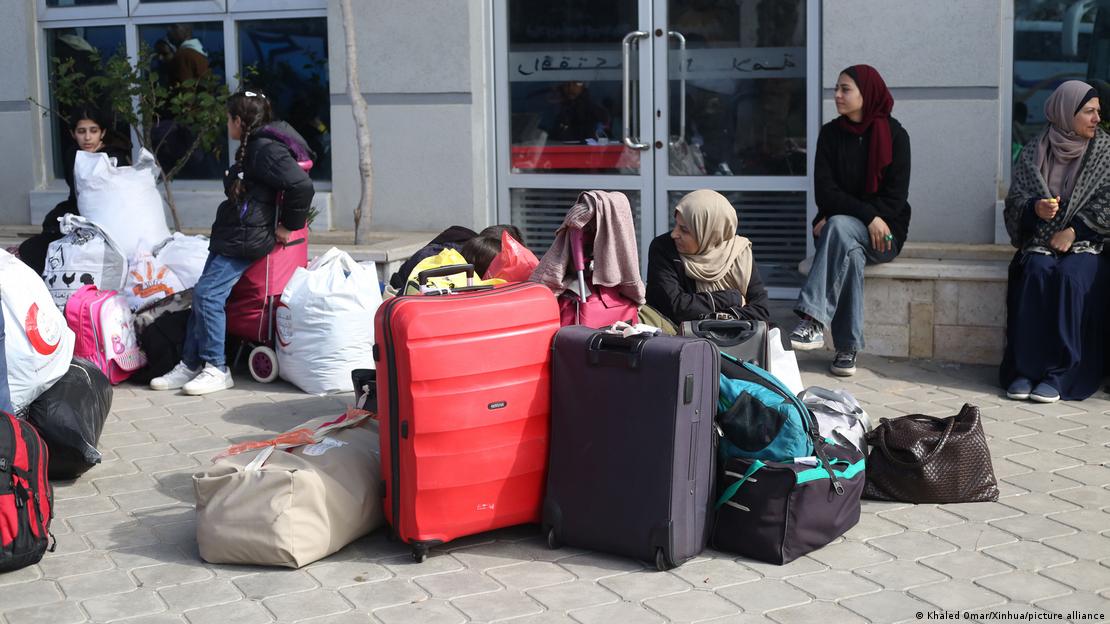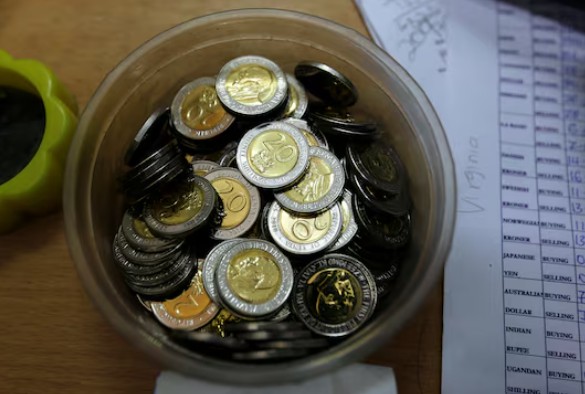Shadowy organisation flies Palestinians out of Gaza

The organisation Al-Majd Europe says it's helping Palestinians emigrate to third countries. But it has been accused of helping facilitate "forcible transfer" from Gaza. DW spoke to a representative of the organisation.
It wasn't the first such flight out of Israel, but it was the first to get so much attention. Late last week, 153 Palestinians from Gaza arrived in South Africa on a charter flight from the Israeli airport of Ramon, but they arrived without the correct documentation.
Given how tightly Israel controls its borders — and those of the Palestinian territory that the passengers had to cross to make it to the Israeli airport — South African authorities couldn't work out how the plane had even managed to leave.
More To Read
- Egypt rejects US plan for foreign control in Gaza, insists Palestinians must govern themselves
- Over 60,000 African penguins died as sardines disappeared from South Africa’s waters, study finds
- Report links 60,000 penguin deaths to sardine decline, poor fisheries management
- Gaza’s once-growing economy nears total collapse amid war and blockade
- ‘Decisive action’ needed to end Israel-Palestine stalemate, UN warns
- Palestinian police to be trained in Egypt as Gaza rebuilds security forces
Later on, Palestinian passengers told journalists that travel had been arranged by an organisation called Al-Majd Europe.
On its website, the organisation says it arranges "humanitarian evacuation." But activists have been raising concerns about flights organised by Al-Majd Europe since summer.
Shadowy organisation
Al-Majd claims it was founded in Germany in 2010 and is now located in Jerusalem. However, no such organisation exists on either the German charity register or the German companies register, and researchers from the Israeli newspaper Haaretz say the same is true there.
Al-Majd's website uses pictures of individuals from other crisis situations and claims them as its own. The website's IP address, and therefore its real location, is hidden by privacy software.
The "donate" button on the website doesn't work. DW's own research on various Bitcoin trackers — which show how much money an account has spent and received — indicates Al-Majd has only ever received around $106 (€91) worth of cryptocurrency via the Bitcoin account it lists for donations. This is despite the fact that it says it works with donations to assist the needy.
The Palestinian passengers who travelled with Al-Majd to South Africa told Al Jazeera journalists they paid between $1,500 and $2,000, but this was sent to what they referred to as personal accounts.
An enquiry DW sent to the email address on Al-Majd's website was not answered.
This week, an investigation by Israeli newspaper Haaretz found more anomalies, including that Al-Majd is connected to Tomer Jamar Lind, an individual with dual Israeli-Estonian citizenship who's based in London. DW reached out to Lind for comment about reporting that he was connected to Al-Majd, but received no response.
The air charter companies — Fly Yo, based in Romania, and Kibris Turkish Airlines, based in Cyprus — that took the Palestinians to South Africa are both Israeli-owned.
Reports on Palestinians being flown to unknown destinations 'deeply troubling'
Because of all of this, activists, South African politicians and media raised concerns that Al-Majd could well be part of a plan to transfer Palestinians out of Gaza.
DW asked the Israeli Ministry of Defence, which is responsible for Israel's official business in Gaza, about any connections to Al-Majd Europe, but did not receive a reply by the time of publication Tuesday night.
"The reports about people being flown to sometimes unknown destinations by Al-Majd are deeply troubling," says Tania Hary, executive director at Gisha, an Israeli non-profit advocating for Palestinian freedom of movement.
"It appears that this questionable private entity is taking advantage of people's desperation and beginning to quietly fulfil Israel's vision for the transfer of Palestinians."
In February 2025, US President Donald Trump spoke about his "Gaza Riviera" plan, which would require moving locals out of Gaza to third countries. The same month, Al-Majd started advertising its services to Palestinians on social media. In March, the Israeli government announced it would create a "directorate of voluntary emigration" within its Ministry of Defence.
Rights groups in Israel raised the alarm back then and say they still don't have much information about the directorate now. Hari says that a policy of "voluntary emigration" from Gaza is supported by senior Israeli politicians, and that Israeli intelligence agencies previously sent text messages to Gaza residents "inviting them to explore departure options."
Al-Majd representative: 'Helping people to live'
DW was able to contact a man named Omar, whose number is listed on Al-Majd's website as a contact. DW could not independently verify that he works for Al-Majd. In an interview via WhatsApp, he said he was a Palestinian living in Jerusalem but wouldn't give further details, including his last name, for security reasons.
He told DW that speculation about Al-Majd's connections to the Israeli government is being spread by two groups — the Hamas group and the Palestinian Authority, which governs the occupied West Bank. He implied these two groups don't want people to leave Gaza. DW could not independently verify these claims.
Omar also said that, to get people out of Gaza and to the airport in Israel, Al-Majd had to be in touch with Israel's Coordinator of Government Activities in the Territories, or COGAT, which runs Israel's official business in Gaza. COGAT is also part of Israel's defence ministry.
"I'm helping my people in Gaza, and this isn't emigration," Omar insisted. "I'm helping people who want to live, not die inside Gaza."
But Omar refused to answer more challenging questions, for example, about connections to Lind, how he got in touch with international, Israeli-owned charter companies and why the links on Al-Majd's website don't work. Nor would he explain Al-Majd's finances, and he said he "couldn't remember" how many Palestinians had left Gaza with Al-Majd.
So it remains unclear whether Al-Majd is connected to the Israeli government, whether it could be a private citizens' initiative in support of the government's policies or whether it is simply a money-making venture.
Cooperation with Israel authorities
What is certain, though, is that Israeli security forces would have had to cooperate with the charter flights that left the country.
Israel has restricted Palestinians' freedom of movement since 1967, when it occupied the Palestinian Territories. Those restrictions have evolved depending on the level of tensions between Israel and Palestinian militant groups. Before the current conflict, travel out of Gaza was allowed for work, for medical treatment or in "exceptional humanitarian cases," such as the wedding or funeral of a first-degree relative.
Today, with Israel's blockade of Gaza, it's even harder to leave the coastal enclave — although since the announcement of the directorate of voluntary emigration, Israeli media reports suggest it has become easier.
There are no official numbers on how many Palestinians have left Gaza.
The World Health Organisation has organised 2,589 medical evacuations this year, with 5,000 companions. It's also thought that in early 2024, more than 100,000 Palestinians made their way to Egypt. But since then, as the Times of Israel reported in May this year, there haven't been as many departures.
Emigration a sensitive subject
The issue of Palestinians leaving Gaza, even now, is politically fraught.
"Under international law, every person has the right to live in their country in safety and dignity, to leave for their own security or any other reason and to return to it," explains Omar Shakir, Israel and Palestine director at Human Rights Watch. "The challenge in the Israeli-Palestinian context is that the Israeli government has a decades-long track record of blocking Palestinian refugees from their right to return home."
Other aid organisations have also criticised this. "Israel’s failure to respect the right to return for Palestinians who were forced to flee their homes in 1948 is a flagrant violation of international law that has fuelled decades of suffering," Amnesty International wrote in 2019.
In May, a survey by the Palestinian Centre for Policy and Survey Research found that around half of Palestinians in the occupied territories would be willing to apply to emigrate. Before the current conflict started, it was around 25 per cent. And beneath Al-Majd Europe's posts on TikTok, you'll see hundreds of comments from desperate Palestinians.
"Under today's devastating conditions in Gaza, any such 'encouragement' cannot amount to free choice," argues Gisha director Hary. "All the more so as Israel refuses to guarantee that people who leave will be allowed to return. Taken together, the unlivable conditions and the official promotion of 'voluntary departure' reflect a pattern of forced transfer disguised as free choice."
Forcible transfer of a population is a crime against humanity under international law.
Top Stories Today












































